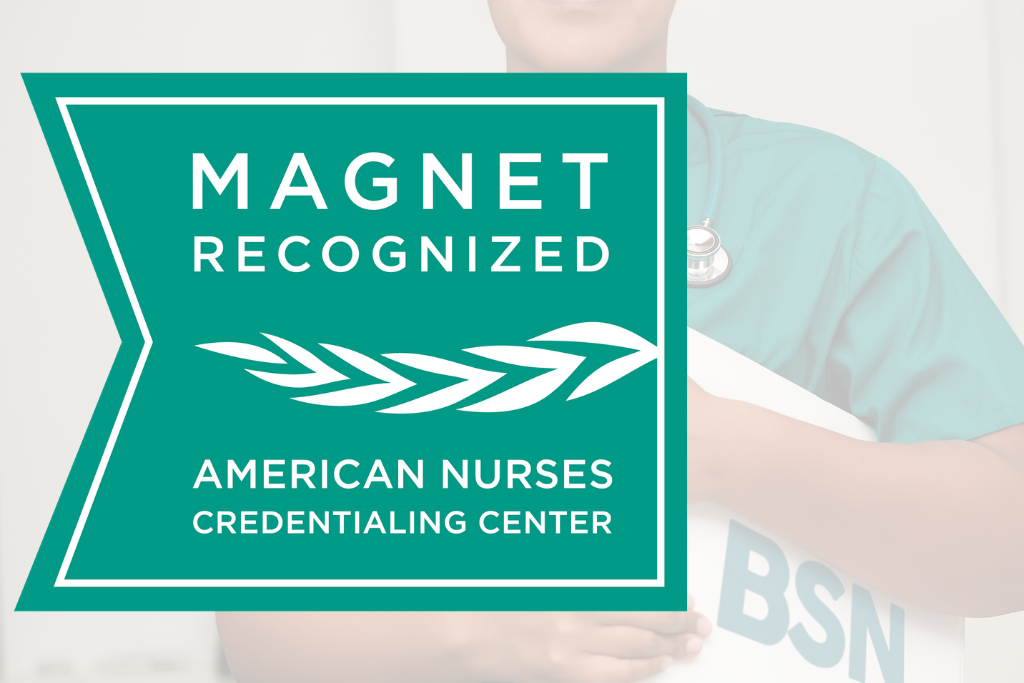In 1993, the American Nurses Credentialing Center (ANCC) announced it’s Magnet Hospital Recognition Program for Excellence in Nursing Services program. The American Nurses Association and the ANCC recognize Magnet hospitals as those who create and sustain a culture of excellence. In 1997, the program became known as The Magnet Nursing Services Recognition Program. But what exactly is a Magnet hospital and what are the Magnet BSN requirements?
What is a Magnet hospital?
In the 1990s, the ANCC adopted the Magnet Program. Magnet status is an award given by the ANCC to hospitals that satisfy specific standards for patient care and nursing quality. These standards measure the quality of the nursing department. According to the ANCC, The Magnet Recognition Program provides a roadmap to nursing excellence, which benefits the whole organization. Hospitals that achieve Magnet status are recognized for creating a collaborative culture that places nurses at the center of patients’ journeys.
The Magnet Model
In 1983, The American Academy of Nursing (AAN) Task Force on Nursing Practice in Hospitals conducted a study to identify specific qualities in hospitals. These elements distinguished which hospitals were most likely to attract and retain skilled nurses compared to other hospitals. Forty-One of 163 hospitals possessed the conditions that, according to AAN, promoted quality patient, resident, and client care. These characteristics are known as the 14 Forces of Magnetism. They serve as the foundation for the model of magnetism led by the ANCC.
The 14 Forces of Magnetism combine into five model components. The magnet model reflects a greater focus on measuring outcomes while retaining the 14 Forces of Magnetism as its foundation.
Magnet hospitals must meet the ANCC’s eligibility requirements in these five key components:
- Transformational Leadership- Quality of nursing leadership and management style.
- Structural Empowerment- Policies and processes that empower nurses to practice professionally and autonomously to achieve the highest degree of clinical excellence and professional fulfillment.
- Exemplary Professional Practice– Comprehensive understanding of the role of nursing and its role in patients, families, the community, and interdisciplinary teams. How does the application of new knowledge and evidence drive the nursing practice forward?
- New Knowledge, Innovation, and Improvement– Provide nurses with up-to-date, evidence-based information.
- Empirical Quality Results. How do patient outcomes compare to benchmarks?
Does Magnet status really make a difference?
Only about 10% or 400 US hospitals have obtained Magnet recognition. Magnet status means the nursing leaders value their nursing staff, and nurses are involved in the decision-making process of patient care.
Nursing departments in Magnet hospitals:
- Deliver excellent patient outcomes
- Have a higher level of job satisfaction
- Have a lower staff nurse turnover rate
- Resolve grievances appropriately
According to the ANCC, hospitals with Magnet status exhibit lower:
- Mortality rates
- Failure-to-rescue rates
- Patient fall rates
- Nosocomial infections
- Hospital-acquired pressure ulcer rates
- Central line-associated bloodstream infection rates
According to Becker’s Hospital Review, in a study by The Joint Commission Journal on Quality and Patient Safety, patients at hospitals that have received or applied for Magnet status have a lower risk of developing a pressure ulcer than patients at other hospitals. Additionally, surgical patients treated in Magnet hospitals, compared to those treated in non-Magnet hospitals, were 7.7 percent less likely to die within thirty days and 8.6 percent less likely to die after a postoperative complication.
How do hospitals get Magnet status?
The process of achieving magnet recognition takes time and can be expensive. On average, the process takes more than four years and costs over 2 million dollars. To obtain Magnet status, hospitals must meet several criteria, including:
- Chief Nursing Officers (CNO). The CNO must actively participate in the organization’s governing body. The CNO must have at least a master’s degree. If the master’s degree is not in nursing, then the CNO must have a bachelor’s or doctorate in nursing.
- Data collection. The hospital must collect relevant and updated data about nursing and care delivery to identify areas needing improvement.
- Involvement. Nurses are actively involved and have a say in patient care and data collection.
- Bachelor of Science in Nursing (BSN). The organization must employ nurses who recruit, develop, and manage the nursing staff. Nurses with the title of manager or higher, must be registered nurses and hold a BSN.
- Site Observations. Pass site observations and evaluations conducted by the ANCC.
- Feedback. Provide substantial ways for nurses to confidentially provide feedback about their working environment and concerns about the facility’s practices.
These criteria help hospital and nursing staff develop evidence-based nursing practices.
What do the critics say?
The Magnet program does not come without critics. According to one study featured in Healthcare Finance, Magnet hospitals don’t provide better working conditions for nurses than non-magnet hospitals. According to the study, Magnet status has little emphasis on nurse working conditions such as work schedules, hours, and job demands.
Getting a job at a Magnet Hospital
If you’ve set a goal of working at a hospital that’s obtained Magnet status, here are a few tips:
- Consider obtaining a BSN. The ANCC suggests hospitals have a plan to increase their bachelor prepared nurses by 80%. Although some hospitals hire nurses with associate degrees, some have a Magnet BSN requirement and most give preference to RNs with BSNs. Others give their nurses a limited timeframe to obtain a BSN. Furthermore, if you desire to advance to a leadership position, a BSN or MSN is preferred and may be required.
- Spruce up your resume. Showing that you have experience or interest in professional development or leadership is a big plus for Magnet hospitals.
- Networking. Building relationships is also an excellent way to get your foot in the door at a Magnet hospital. Research Magnet status hospitals in your area and develop relationships with the HR department or nurse leaders on the floor you are interested in pursuing.
What hospital networks are Magnet?
The American Nurses Association has a tool that nurses can use to find magnet-approved hospital systems in their state. Check it out.
What nurses say
So what is the magnet hospital interview process like? Hear first hand from other nurses.
Becca Darwish BSN, RN-BC states, “If you were interviewing, your five-year plan would be different for a Magnet hospital vs. non-Magnet. You are expected to grow, advance in your career, and plan that out in your yearly goals.”
Dr. Janine Avent, Ph.D., MBA, MHA, RN LNC, states, “The hiring process was different for me because I was in leadership ( Director of Graduate Residency Program). The hospital system wanted me on two of the committees for the magnet journey. I had to interview with all members of the departments, VP of nursing, etc. I had four total interviews. I was hired, but the process was rigorous.
Avent adds, “As far as staff interviews, I only interviewed RNs. If you had your ADN and had not enrolled in a BSN, the hospital gave you two years to obtain your BSN. Nurses who did not obtain their BSNs were let go. We had to have 80% of the hospital as BSN prepared nurses.
- The main campus did not hire any more RNs with an ADN.
- No LPNs worked in the actual hospital.
From my experience, every system is different. Now, when you apply, the application will ask if you have a BSN or higher. If your answer is no, the application process stops.”
Tiffany Gibson MSN, NPD-BC, CPN, GHDl, shares, “Magnet hospitals only hire external candidates who are BSN prepared RNs. Magnet-designated hospitals have achieved exemplary patient outcomes, professional practice, and transformational leadership. Also, to be considered, Magnet hospitals recruit and are intentional in retaining MSN prepared nurses. So, for the MSN nurse applying for a new job at a Magnet site, make sure you’re able to grow your expert wings. Take advantage of the:
- Continuing education
- Leadership opportunities
- Benefits
- Professional development offerings
It is a win/win for both parties. Be an opportunist!”
Do hospitals support RN-BSN programs?
Depending on the area you live and work, your hospital system may pay for you to obtain your BSN if it has a Magnet BSN requirement. However, areas with an oversaturation of nurses who have BSN degrees or higher, may not be as eager to pay for you to further your education as those with a shortage.
Dr. Sharrica Miller Ph.D., RN states, “Certain areas are saturated with nurses, such as Southern and Northern California and even the New York area. There may not be many hospitals available that will pay for or reimburse a nurse pursuing RN-BSN. It’s important for nurses to check the hospital system in their areas before deciding to pursue ADN, hoping the hospital will pay for their BSN. Simply because some areas have a saturation of BSN-prepared nurses, it may be difficult to find a hospital that may be willing to pay for a BSN.”
 Portia Wofford is an award-winning nurse, writer, and coach for nurse writers. After dedicating her nursing career to creating content and solutions for employers that affected patient outcomes, these days Portia strives to empower nurses by offering resources for mental wellbeing–while empowering health related businesses to grow their communities through engaging content that connects and converts. Follow her on Instagram and Twitter for her latest.
Portia Wofford is an award-winning nurse, writer, and coach for nurse writers. After dedicating her nursing career to creating content and solutions for employers that affected patient outcomes, these days Portia strives to empower nurses by offering resources for mental wellbeing–while empowering health related businesses to grow their communities through engaging content that connects and converts. Follow her on Instagram and Twitter for her latest.
Some links in this article were updated in October 2024.

